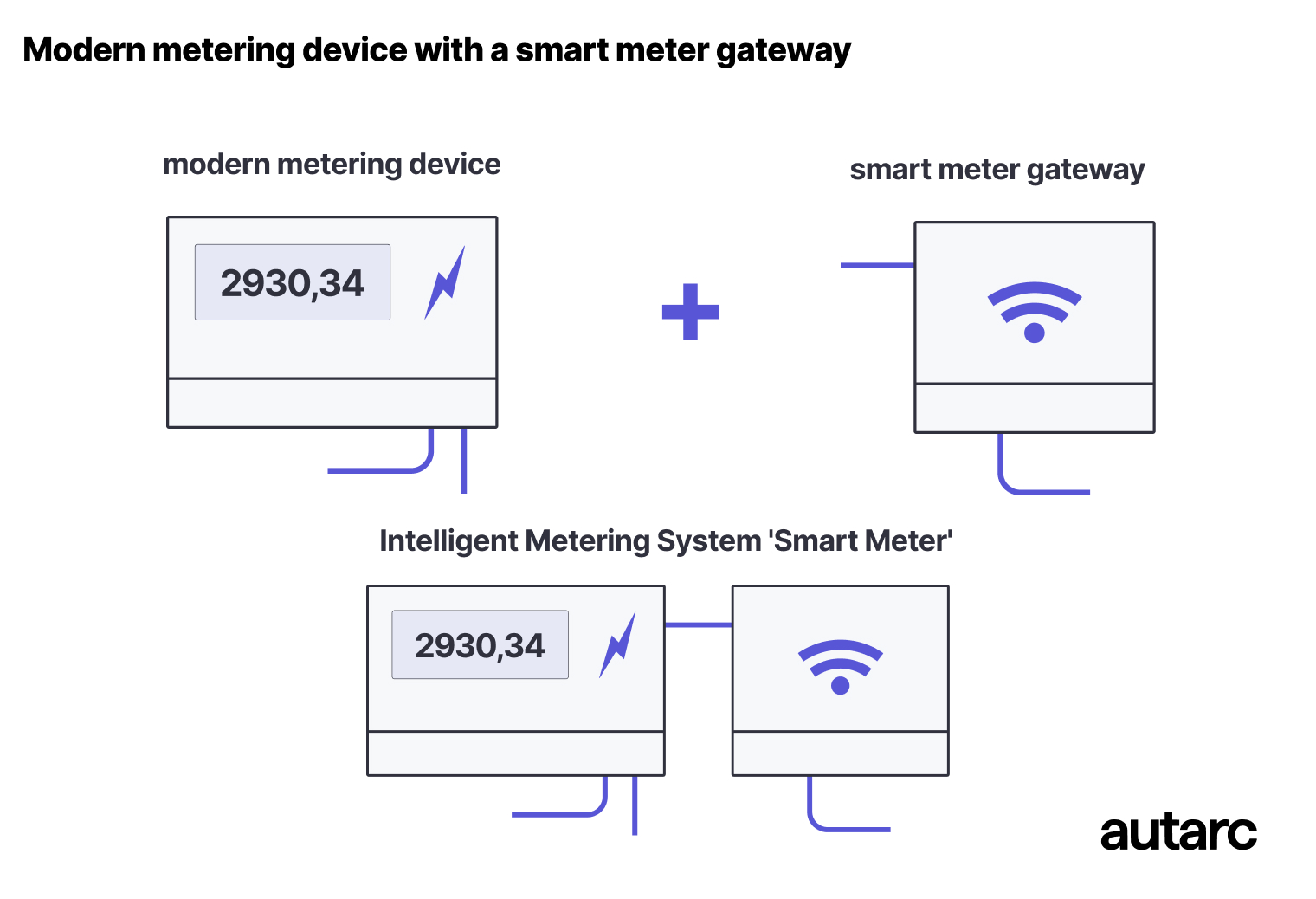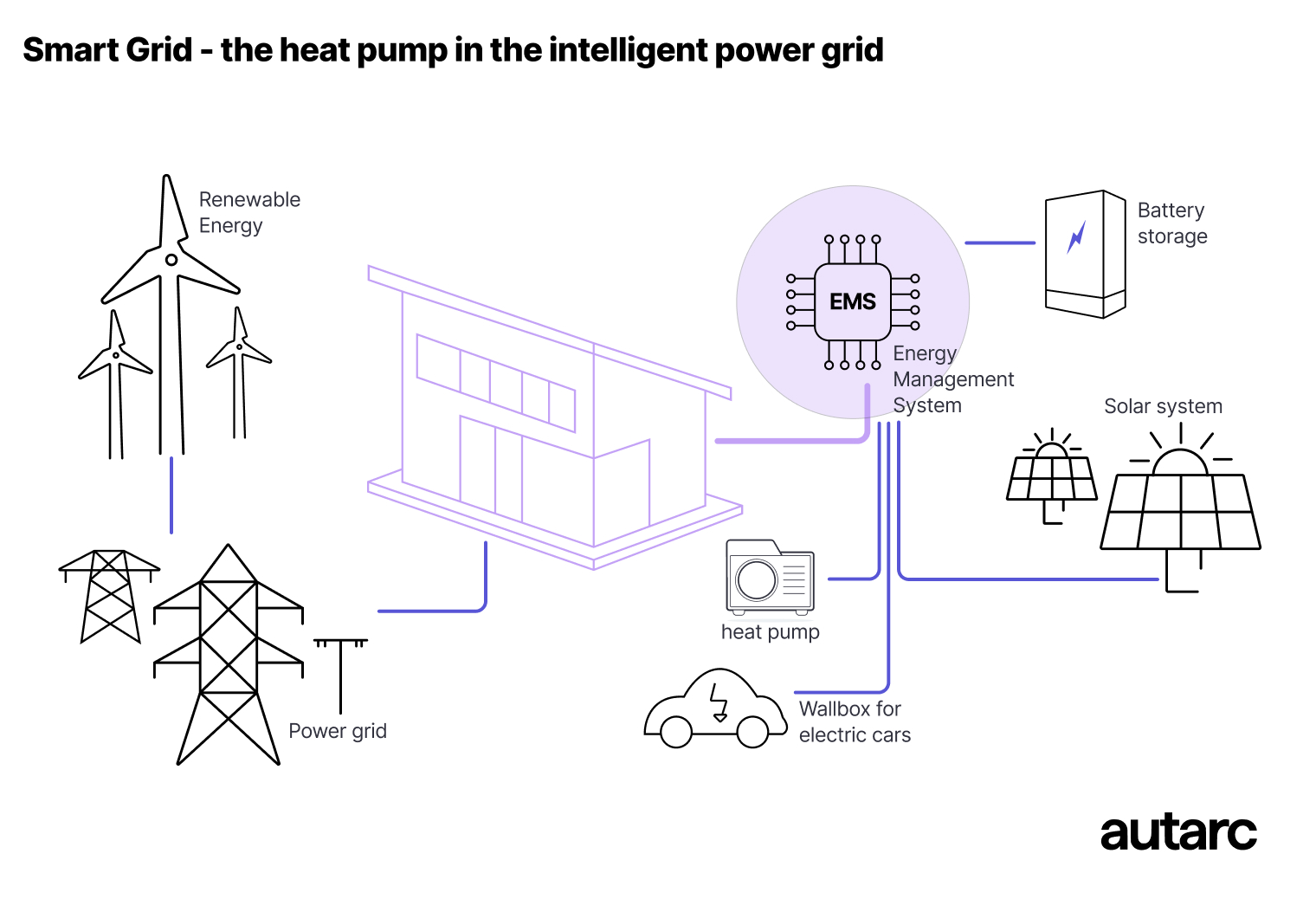Smart meter requirement for heat pumps: That will change in 2025

The energy revolution is progressing, and with it, the requirements for households with heat pumps are changing. From 2025, there will be an innovation that should control electricity consumption more intelligently. What does this mean for your own household? And who must act now? You can find out here.
What is a smart meter?
A Smart meter is an intelligent electricity meter that digitally measures energy consumption and automatically transmits it to the network operator. In contrast to conventional meters, which only display total consumption, a smart meter records power consumption in real time and enables more precise control of energy consumption.
It consists of two main components:
- Modern measuring device (mME) — Digitally records power consumption and stores it in detail.
- Smart meter gateway — Transmits consumption data in encrypted form to the network operator or other authorized bodies.

Thanks to this technology, consumption profiles can be analyzed, load peaks identified and electrical devices can be controlled in a targeted manner. This can be particularly advantageous for heat pumps, as power consumption can be adjusted depending on network load.
For whom is installation mandatory in 2025?
The installation of a smart meter will be mandatory for the following household groups from 2025:
- households with high energy consumption: households with more than 6,000 kilowatt-hours (kWh) per year consume, are required to install a smart meter. The average consumption of the last three years is decisive. If sufficient values are not available, a consumption forecast from the network operator is used.
- Householders with electricity-generating systems: households that have a photovoltaic system or other power generation plants With a nominal power of more than 7 kilowatts operate, must install a smart meter. This regulation primarily affects operators of larger PV systems.
- Householders with controllable consumer devices: households that Heat pumps or charging stations for electric cars use, are also affected. Loud Section 14a of the Energy Industry Act May network operators regulate the power consumption of these controllable devices when the network is overloaded. The technical implementation absolutely requires an intelligent measurement system.

Why is installation mandatory?
The obligation to install a smart meter should Improve grid stability And the Energiewende push ahead. The increasing use of renewable energies such as solar and wind power as well as the growing demand for electricity from heat pumps and electric cars require more efficient control of the power grid.
- Ensuring grid stability: Smart meters help identify and control consumption peaks. When overloaded, network operators can regulate controllable devices such as heat pumps and reduce the load on the power grid.
- Integration of renewable energy sources: Renewable energies depend on the weather and fluctuate strongly in their supply. With smart meters, these fluctuations can be better balanced out by coordinating consumption and generation more flexibly.
- Transparency and consumption optimization: Users get detailed insights into their energy consumption and can use electricity more efficiently, for example through dynamic electricity tariffs.
- Promotion of flexible tariffs: With smart meters, electricity providers can offer time-based electricity tariffs, which allows households to use cheap electricity when the grid is less loaded.
- Preparing for the future: The increasing demand for electricity due to electric mobility and heat pumps requires intelligent systems to make optimal use of existing network capacity without unnecessarily accelerating expansion.
What choices do households have?
Householders with a heat pump can choose between two different types of meters, depending on requirements and legal requirements:
Intelligent meter in standard configuration
Some functions of the smart meter remain limited. Consumption data is collected and stored in less detail and without the data being passed on in real time. This option offers more data protection, but also less flexibility when using dynamic tariffs.
Intelligent measuring device in advanced configuration
This configuration allows maximum use of all smart meter functions. This includes detailed consumption data in real time, automatic transmission to the network operator and the option of using time-dependent electricity tariffs. Consumption data is collected and stored at short intervals.
How can you choose as a consumer?
As standard, households with a heat pump receive an intelligent measurement system in the standard configuration (IMS for short). It offers basic functions such as daily transmission of electricity consumption. However, consumers can advanced configuration (IME for short, opt-in) so that they can use additional functions such as the transfer of 15-minute consumption values, more precise analyses and dynamic electricity tariffs. However, there is an additional cost for these advanced features.
The selection is usually made by the metering point operator, who provides information about the options and possible additional costs.
How much does a smart meter cost?
The costs for a smart meter for households with a heat pump are between 20 and 100€ (gross) per year. They consist of an annual basic fee and possible additional costs for special functions.
Here is an overview of the costs:
How does the installation work?
The installation of a smart meter is usually carried out by the responsible metering point operator and is easy for consumers. As a rule, households with heat pumps do not have to actively take care of this. The operator is required by law to install it. The process is carried out in several steps:
- Notification from the metering point operator: The operator will inform the household in good time about the planned installation. This is usually done in writing and includes details of the deadline, costs and planned work.
- Make an appointment: A technician appointment is coordinated with the consumer.
- Installing the smart meter: The technician removes the old electricity meter and installs the new smart meter. This ensures that the heat pump continues to function properly. The work usually only takes 30 to 60 minutes and do not require extensive construction measures.
- Start-up and testing: After installation, the smart meter is tested and ensured that all functions — in particular data transmission and controllability — work correctly. The technician also explains the basic functions of the device.
- Documentation and completion: Finally, the technician documents the installation. The consumer receives information about usage and, if necessary, access data for an online portal through which consumption data can be viewed.
What data do smart meters send and receive?
Smart meters record and transmit a wide range of data, such as consumption, performance, billing and status data. These are important for network control, consumption analysis and billing. They send data to the network operator and can receive certain control signals.
Is my data secure?
Smart meters are subject to strict data protection requirements. Consumption data is encrypted and only transmitted to authorized bodies such as network operators. The Federal Office for Information Security (BSI) certifies all smart meters before they are installed. In addition, data may only be used for clearly defined purposes and must then be deleted.
Consumers are normally unable to view or assign any personal data. Users can access their own consumption data via an online portal from the metering point operator, if this function is activated.
What are the advantages and disadvantages of the new electricity meters?
Smart meters offer numerous advantages, particularly for households with heat pumps, such as improved consumption transparency and the ability to use dynamic tariffs. At the same time, however, there are also disadvantages, such as potential additional costs and data protection concerns.
autarc: Your partner for efficient heat pump solutions — find out more now!
Rely on quality and expertise when planning and installing heat pump systems. With our heat pump check, you receive comprehensive support so that you can implement your projects efficiently and sustainably. Contact us today and benefit from our expert knowledge!
%25203%2520(1).webp)